翻译概论总结
翻译概论 重点整理

卡特福德英国《翻译的语言学概论》篇章等值翻译是把一种语言的话语材料用另外一种语言的等值话语予以替代行文对等形式对应尤金·奈达美国翻译是指从语义到语体在译入语中用最切近而又最自然的对等语再现原语信息动态对等功能对等巴尔胡大罗夫苏联《语言与翻译》意义不变尽可能完备的传达原文各种类型的语义,包括所指意义、实用意义和语言内部意义彼得·纽马克英国表达功能------ 语义翻译信息功能呼唤功能------- 交际翻译卡瑟琳娜·莱斯,汉斯·威密尔,克里斯蒂安·诺德。
德国功能学派功能翻译理论以原语为取向:竺法护西晋,尼古拉斯·封·维尔德国,赛珍珠美国以译入语为取向:支谦康僧会唐朝,鸠摩罗什东晋,西塞罗贺拉斯古罗马以翻译目的为导向的翻译标准威密尔德国泰勒特“翻译三原则”严复“信达雅”翻译标准:主观向客观、散论到系统、静态向动态、单一向多元发展第三章佛经翻译对中国文化产生的影响语言方面:佛经翻译大大丰富了汉语词汇;在语法方面,汉语受佛经翻译的影响也不少文学方面:印度寓言故事神话传入中国,对中国文学题材内容有影响;对我国文学的思想情趣产生影响;汉译佛典对我国文学文体方面有巨大影响哲学方面:佛教对道教的影响;对儒家思想体系的影响,沿用了佛学的辩证逻辑思路翻译传递的是文化信息;语言是文化的基础,是文化得以流传的载体,是文化的镜子。
译者的责任:微观上,正确处理文字技术层面上的责任;宏观上,促进社会发展和文化交流方面的责任译者在技术层面上的责任:既不能对不起原作者,也不能对不起译文,往往也就是译者自己的国文得其精而忘其粗,在其内而忘其内译者在社会和文化层面上的责任:要对社会负责;要有稳定的立场译者的素质:彼得·马克:本国语方面,掌握丰富的词汇和各种句型;精通外语;能顺利用本国语表达原著意义尤金·奈达:熟悉原语;精通译语;充分了解所译题材;具备“移情”本领;具备语言表达的才华和丰富的文学想象力第六章纽马克《翻译教程》交际翻译将原语文本的语境意义以其思想内容和语言形式都容易为译入语读者所接受和理解的方式准确地传递出来汉斯·威密尔翻译是一种目的性行为(功能学派)目的论的核心概念:翻译方法和翻译策略必须由译文预期目的或功能来决定施莱尔马赫德国将翻译方法归为两类1、尽量不动读者而将原作者拉过来,即归化2、尽量不动原作者,而将读者推过来,即异化(施莱尔马赫本人推崇)雅各布逊从符号学的角度将翻译分成三类:语内翻译、语际翻译、符际翻译总结:翻译不仅仅是纯语言间的文字转换,而首先是一种交际行为,是为了达到特定环境和条件下的特定交际目的第七章翻译活动的处理方式分类:全译;节译、摘译、编译、译述(边翻边译)文体分类:文学翻译、非文学翻译活动方式分类:笔译、口译乔治·斯坦纳美国阐释学的角度出发,将翻译过程归纳为:信任、进攻、吸收、补偿翻译过程主要是理解与表达的过程,理解是翻译的第一步第十章直译和逐字译的区别直译照顾到译入语的语法规范,对原文形式作必要的调整,文字通顺;逐字译不顾译入语的语法规范和表达习惯,视原文为神圣不可侵犯,一味追求形式对应,文字晦涩生硬意译的定义张今:强调意译的文字同原文相比,采用了“新的表现法”;范仲英:强调译文表达的“自然流畅”;孙致礼:强调传达原文的精神主旨,为此原文的表现形式是可以牺牲的;许渊冲:将直译和意译进行对比,强调忠实于原文是最起码的要求。
翻译概论翻译的目的之交际
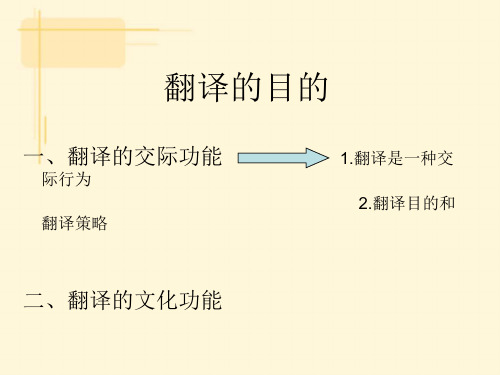
交际翻译法在汉英新闻翻译中的应用 ----以Suzhou Weekly为例
• 采取何种翻译方法取决于三个因素:文本类型、读者身份和翻译目的。 新闻属信息型语篇,适合用交际翻译法。以纽马克的交际翻译理论为 依据,对Suzhou Weekly中的若干汉英译例从标题改写、词汇变通和 句法重组三个方面进行了分析,以期为解决汉英新闻翻译中可能遇到 的种种问题探索切实可行的解决方案。 • [Abstract]Newmark contends that the choice of translation method is determined by three factors: type of text, nature of the readership and purpose of the translation. Accordingly, communicative translation method applies to the translation of news, which falls into the type of informative text. This paper, based on Newmark‟s communicative translation theory, explores feasible solutions to various problems likely encountered in Chinese-English news translation by analyzing the typical examples taken from Suzhou Weekly in terms of three aspects: title rewriting, lexical change and syntactic restructuring.
翻译概论

The Princess Diaries
《公主的日记》讲述一个纽约城里一 公主的日记》 个普普通通的女孩儿, 个普普通通的女孩儿,甚至在学校被视 为透明, 为透明,但被证实是一个临近小国的公 而后公主由皇后 皇后奶奶调教为举止优 主,而后公主由皇后奶奶调教为举止优 雅的真正公主, 雅的真正公主,并最终选择担当起治理 国家的责任的故事。 国家的责任的故事。
感谢你在我伤心时安慰我, 感谢你在我伤心时安慰我, 当我生气时你护著我, 当我生气时你护著我, 当我沮丧时你拉拔我。 当我沮丧时你拉拔我。 感谢你作我的朋友并且在我身 旁, 教导我爱的意义是什么, 教导我爱的意义是什么, 当我需要动力时你鼓励我。 当我需要动力时你鼓励我。 但我最想感谢你的是, 但我最想感谢你的是, 爱上像我这样的一个人。 爱上像我这样的一个人。
魂断蓝桥片段
翻译的标准
1898年严复提出“信、达、雅” 年严复提出“ 年严复提出 译文准确,不增减原文的意思。 信:译文准确,不增减原文的意思。 Faithfulness 译文通顺流畅,符合语言规范。 达:译文通顺流畅,符合语言规范。 Expressiveness 注重修辞,词语得体, 雅:注重修辞,词语得体,简明优雅 elegance
Never trouble trouble till trouble trouble you . 麻烦没来找你,不要自找麻烦。 麻烦没来找你,不要自找麻烦。 Too much curiosity lost paradise. 太强好奇心,失去伊甸园。 太强好奇心,失去汇、 创造性的语言活动: 翻译是涉及词汇、语 的语言活动 法、逻辑以及文化背景知识等诸方面的一种 创造性的劳动。 创造性的劳动。 Roman Holiday 《罗马假日》故事讲述了一位欧洲某公国的 罗马假日》 公主与一个美国记者之间在意大利罗马一天 之内发生的浪漫故事。 之内发生的浪漫故事。
翻译概论期末总结
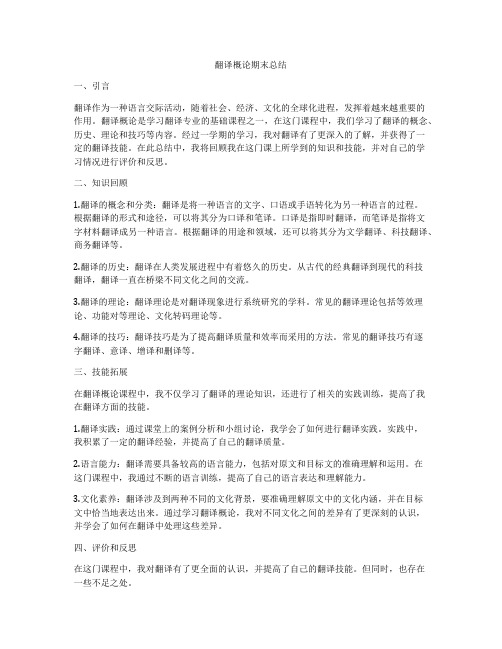
翻译概论期末总结一、引言翻译作为一种语言交际活动,随着社会、经济、文化的全球化进程,发挥着越来越重要的作用。
翻译概论是学习翻译专业的基础课程之一,在这门课程中,我们学习了翻译的概念、历史、理论和技巧等内容。
经过一学期的学习,我对翻译有了更深入的了解,并获得了一定的翻译技能。
在此总结中,我将回顾我在这门课上所学到的知识和技能,并对自己的学习情况进行评价和反思。
二、知识回顾1.翻译的概念和分类:翻译是将一种语言的文字、口语或手语转化为另一种语言的过程。
根据翻译的形式和途径,可以将其分为口译和笔译。
口译是指即时翻译,而笔译是指将文字材料翻译成另一种语言。
根据翻译的用途和领域,还可以将其分为文学翻译、科技翻译、商务翻译等。
2.翻译的历史:翻译在人类发展进程中有着悠久的历史。
从古代的经典翻译到现代的科技翻译,翻译一直在桥梁不同文化之间的交流。
3.翻译的理论:翻译理论是对翻译现象进行系统研究的学科。
常见的翻译理论包括等效理论、功能对等理论、文化转码理论等。
4.翻译的技巧:翻译技巧是为了提高翻译质量和效率而采用的方法。
常见的翻译技巧有逐字翻译、意译、增译和删译等。
三、技能拓展在翻译概论课程中,我不仅学习了翻译的理论知识,还进行了相关的实践训练,提高了我在翻译方面的技能。
1.翻译实践:通过课堂上的案例分析和小组讨论,我学会了如何进行翻译实践。
实践中,我积累了一定的翻译经验,并提高了自己的翻译质量。
2.语言能力:翻译需要具备较高的语言能力,包括对原文和目标文的准确理解和运用。
在这门课程中,我通过不断的语言训练,提高了自己的语言表达和理解能力。
3.文化素养:翻译涉及到两种不同的文化背景,要准确理解原文中的文化内涵,并在目标文中恰当地表达出来。
通过学习翻译概论,我对不同文化之间的差异有了更深刻的认识,并学会了如何在翻译中处理这些差异。
四、评价和反思在这门课程中,我对翻译有了更全面的认识,并提高了自己的翻译技能。
但同时,也存在一些不足之处。
翻译概论
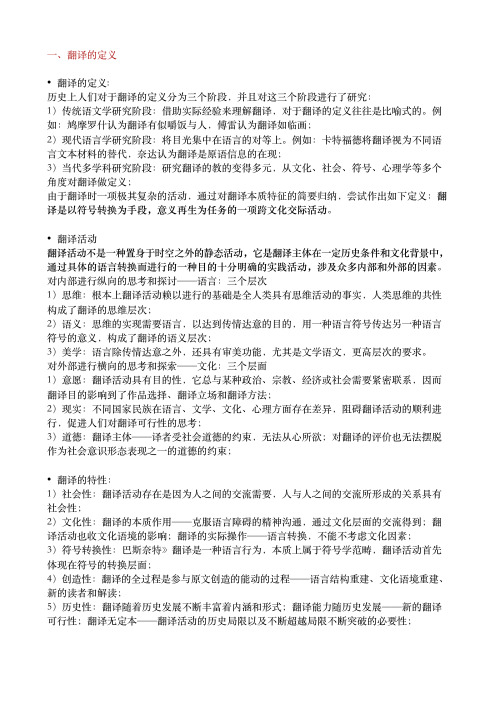
⼀、翻译的定义•翻译的定义:历史上⼈们对于翻译的定义分为三个阶段,并且对这三个阶段进⾏了研究:1)传统语⽂学研究阶段:借助实际经验来理解翻译,对于翻译的定义往往是⽐喻式的。
例如:鸠摩罗什认为翻译有似嚼饭与⼈,傅雷认为翻译如临画;2)现代语⾔学研究阶段:将⽬光集中在语⾔的对等上。
例如:卡特福德将翻译视为不同语⾔⽂本材料的替代,奈达认为翻译是原语信息的在现;3)当代多学科研究阶段:研究翻译的教的变得多元,从⽂化、社会、符号、⼼理学等多个⾓度对翻译做定义;由于翻译时⼀项极其复杂的活动,通过对翻译本质特征的简要归纳,尝试作出如下定义:翻译是以符号转换为⼿段,意义再⽣为任务的⼀项跨⽂化交际活动。
•翻译活动翻译活动不是⼀种置⾝于时空之外的静态活动,它是翻译主体在⼀定历史条件和⽂化背景中,通过具体的语⾔转换⽽进⾏的⼀种⽬的⼗分明确的实践活动,涉及众多内部和外部的因素。
对内部进⾏纵向的思考和探讨——语⾔:三个层次1)思维:根本上翻译活动赖以进⾏的基础是全⼈类具有思维活动的事实,⼈类思维的共性构成了翻译的思维层次;2)语义:思维的实现需要语⾔,以达到传情达意的⽬的,⽤⼀种语⾔符号传达另⼀种语⾔符号的意义,构成了翻译的语义层次;3)美学:语⾔除传情达意之外,还具有审美功能,尤其是⽂学语⽂,更⾼层次的要求。
对外部进⾏横向的思考和探索——⽂化:三个层⾯1)意愿:翻译活动具有⽬的性,它总与某种政治、宗教、经济或社会需要紧密联系,因⽽翻译⽬的影响到了作品选择、翻译⽴场和翻译⽅法;2)现实:不同国家民族在语⾔、⽂学、⽂化、⼼理⽅⾯存在差异,阻碍翻译活动的顺利进⾏,促进⼈们对翻译可⾏性的思考;3)道德:翻译主体——译者受社会道德的约束,⽆法从⼼所欲;对翻译的评价也⽆法摆脱作为社会意识形态表现之⼀的道德的约束;•翻译的特性:1)社会性:翻译活动存在是因为⼈之间的交流需要,⼈与⼈之间的交流所形成的关系具有社会性;2)⽂化性:翻译的本质作⽤——克服语⾔障碍的精神沟通,通过⽂化层⾯的交流得到;翻译活动也收⽂化语境的影响;翻译的实际操作——语⾔转换,不能不考虑⽂化因素;3)符号转换性:巴斯奈特》翻译是⼀种语⾔⾏为,本质上属于符号学范畴,翻译活动⾸先体现在符号的转换层⾯;4)创造性:翻译的全过程是参与原⽂创造的能动的过程——语⾔结构重建、⽂化语境重建、新的读者和解读;5)历史性:翻译随着历史发展不断丰富着内涵和形式;翻译能⼒随历史发展——新的翻译可⾏性;翻译⽆定本——翻译活动的历史局限以及不断超越局限不断突破的必要性;⼆、翻译的过程•中西翻译简史:1)西公元前三世纪中叶 / 古罗马对希腊作品的译介 / ⽤拉丁语翻译改编希腊作品罗马帝国后期⾄中世纪初期 / 圣经的翻译 ⽤拉丁语翻译圣经中世纪中期 / 典籍的翻译 / 从阿拉伯语译成拉丁语欧洲⽂艺复兴运动时期 / 翻译活动深⼊到思想、政治、宗教、哲学、⽂学各领域 / 民族语⾔的地位⽂艺复兴后 / 翻译古典著作和近现代作品 /⼆战后⾄今 / 机器翻译 / 翻译的规模范围形式都⼤变2)中东汉到宋 / 佛经翻译明末清初 / 西学翻译鸦⽚战争到清末 / 西学翻译改⾰开放⾄今 / ⼤规模的翻译活动•中西传统翻译观:1)西译者理解作品意思译者掌握两种语⾔译者不屈从逐字翻译译者遵守约定俗成的译法译者注意表达和谐、措辞连贯、衔接紧密,语⾔优美、赏⼼悦⽿缺点:未提及忠实——“信”的程度2)中译者的道德修养服务公众和社会的群体本位思想⼈⽂主义的语⾔观倾向于⽂学翻译的艺术性理论基础——哲学和美学•翻译活动的丰富性:翻译类型多样性:雅各布森将翻译分为三类:语内、语际、符际翻译过程多样性:翻译形态多样》合作翻译、独⾃翻译、传教⼠翻译活动;⽂本形态多样性》1920前后译作的规范;翻译策略多样性》直译/意译、忠实/再创造翻译结果多样性:变译现象(翻译变体)•翻译的过程:指翻译的动态意义,有⼴义和狭义之分。
翻译概论 知识点总结

翻译概论知识点总结翻译概论的研究内容非常广泛,包括翻译理论、翻译原则、翻译方法、翻译接受者的认知过程、翻译技术、翻译评价等方面。
在翻译概论中,我们可以了解到翻译的定义、分类以及与其他学科的关系,可以系统地学习和掌握不同语言和文化之间的对等关系,可以研究和分析翻译的规律和特点,可以探讨翻译活动的内在逻辑和思维过程,可以探索翻译技术和工具的应用,可以评价和分析不同翻译作品的质量和成就,可以洞察翻译行为的伦理和社会责任等等。
从学科发展的历史来看,翻译概论起源于古代的翻译实践和文学批评,发展于19世纪的语言学和社会学研究,成熟于20世纪的应用语言学和跨文化交际研究。
而在当今世界,翻译概论已经成为了独立的学科体系,并且在全球范围内迅速发展和壮大。
随着国际间交流与合作的日益加强,翻译概论必将面临更为广阔的发展空间和更为丰富的研究前景。
翻译概论的研究方法主要包括文献研究、实证研究、对比分析和案例分析等。
通过对相关文献的梳理和分析,可以了解到翻译概论的研究热点和前沿,可以学习到其他学者的研究成果和思想观点,可以拓展自己的学术视野和思维广度。
通过实证研究,可以验证和检验相关理论和假设,可以获取和积累实际的翻译数据和资料,可以分析和总结不同翻译实践的经验和教训。
通过对比分析和案例分析,可以发现翻译活动的规律和差异,可以评价和比较不同翻译作品的优劣,可以揭示和阐释翻译活动的内在机理和外在效果。
翻译概论的研究对象主要包括自然语言、人文文化和社会交往等方面。
从自然语言的角度来看,翻译概论涉及到的语言范畴和语言现象非常丰富,包括语音、语法、词汇、语用等方面。
不同语言之间存在着很多差异和共性,而翻译概论就是要研究和揭示这些差异和共性,促进不同语言之间的互译和互补。
从人文文化的角度来看,翻译概论涉及到的文学、历史、哲学、宗教、艺术等领域非常广泛,而翻译概论就是要研究和理解这些领域的内涵和外延,促进不同文化之间的相互理解和尊重。
许钧——翻译概论

第九章 如何评价翻译
• 从广义上讲,翻译批评就是理解翻译与评价翻译;从狭义上讲,翻译 批评是对翻译活动的理性反思与评价,既包括对翻译现象、翻译文本 的具体评价,也包括对翻译本质、过程、技巧、手段、作用、影响的 总体评价,而不论“具体评价”还是“总体评价”,都依赖并取决于 相关的理论和一定的标准。 • 翻译批评既是对翻译理论的实际应用,也通过实践反作用于翻译理论 ,对翻译理论进行检验、促进和指导。翻译批评的价值应在实践与理 论两方面得以实现。 • 实践层面,翻译批评具有监督功能,包括对译者的指导功能和对读者 的引导功能。理论层面,翻译批评具有理论研究和建构功能。 • 翻译批评根据其不同主体相应地包括读者批评、译者批评和专家批评 三种形式。 • 批评者的主观态度和精神与批评者的客观技能与素质同样重要,批评 者不仅要具备语言能力、文化知识和文学素养,还应树立客观精神、 创造精神和求真精神。 • 随着翻译研究的深度和广度不断加强,对翻译的评价由传统的以“信 ”为基本准绳的单一标准走向多维度、多视角的多元标准。翻译批评 的标准应具有合理性、互补性、历史性和发展性。
翻译概论 Introduction
主讲:许 钧
第一章 翻译概说
• 要研究翻译,诸如翻译的本质、翻译的可行性、翻译的功 能、影响翻译的因素、翻译与文化交流的关系等问题都是 绕不过去的。 • “翻译是什么”的问题涉及对翻译本质的讨论。只有将翻 译活动置于广阔的文化背景之下,通过考察影响、制约它 的种种内外部因素,才能更好地界定、理解这一渗透到人 类社会各个领域的重要活动。 • “翻译的是什么”的问题涉及对翻译中的意义与交流问题 的讨论。对意义的探究之于翻译是第一位的,因为它关系 到对人类交流的可能性及可能性程度的理解。 • “翻译有族内部的文化传呈以及不同民族之间的 文化交流都起着至关重要的作用,因此应该对它的历史作 用给予正确的评价和定位。
翻译概论知识点总结
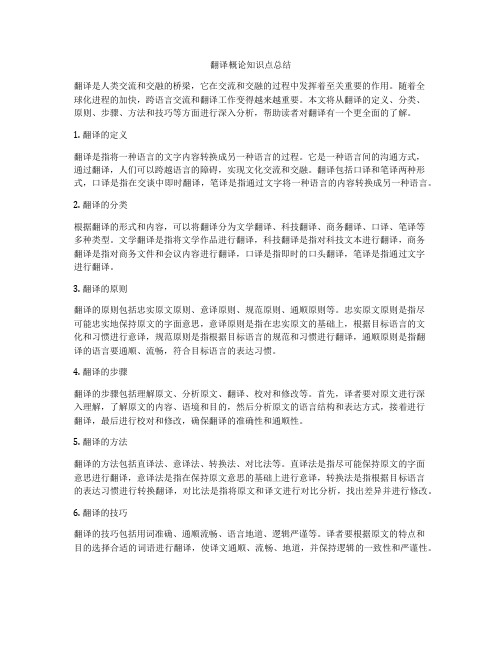
翻译概论知识点总结翻译是人类交流和交融的桥梁,它在交流和交融的过程中发挥着至关重要的作用。
随着全球化进程的加快,跨语言交流和翻译工作变得越来越重要。
本文将从翻译的定义、分类、原则、步骤、方法和技巧等方面进行深入分析,帮助读者对翻译有一个更全面的了解。
1. 翻译的定义翻译是指将一种语言的文字内容转换成另一种语言的过程。
它是一种语言间的沟通方式,通过翻译,人们可以跨越语言的障碍,实现文化交流和交融。
翻译包括口译和笔译两种形式,口译是指在交谈中即时翻译,笔译是指通过文字将一种语言的内容转换成另一种语言。
2. 翻译的分类根据翻译的形式和内容,可以将翻译分为文学翻译、科技翻译、商务翻译、口译、笔译等多种类型。
文学翻译是指将文学作品进行翻译,科技翻译是指对科技文本进行翻译,商务翻译是指对商务文件和会议内容进行翻译,口译是指即时的口头翻译,笔译是指通过文字进行翻译。
3. 翻译的原则翻译的原则包括忠实原文原则、意译原则、规范原则、通顺原则等。
忠实原文原则是指尽可能忠实地保持原文的字面意思,意译原则是指在忠实原文的基础上,根据目标语言的文化和习惯进行意译,规范原则是指根据目标语言的规范和习惯进行翻译,通顺原则是指翻译的语言要通顺、流畅,符合目标语言的表达习惯。
4. 翻译的步骤翻译的步骤包括理解原文、分析原文、翻译、校对和修改等。
首先,译者要对原文进行深入理解,了解原文的内容、语境和目的,然后分析原文的语言结构和表达方式,接着进行翻译,最后进行校对和修改,确保翻译的准确性和通顺性。
5. 翻译的方法翻译的方法包括直译法、意译法、转换法、对比法等。
直译法是指尽可能保持原文的字面意思进行翻译,意译法是指在保持原文意思的基础上进行意译,转换法是指根据目标语言的表达习惯进行转换翻译,对比法是指将原文和译文进行对比分析,找出差异并进行修改。
6. 翻译的技巧翻译的技巧包括用词准确、通顺流畅、语言地道、逻辑严谨等。
译者要根据原文的特点和目的选择合适的词语进行翻译,使译文通顺、流畅、地道,并保持逻辑的一致性和严谨性。
翻译概论Chapter1-2从翻译的比喻认识翻译的本质及翻译的原则

Chapter1----从翻译的比喻认识翻译的本质1.第一章内容概述1)翻译的重要性(对翻译和翻译家的种种比喻):普希金------“人类精神的传递者。
”歌德------“世界上全部交际来往中最重要、最高贵的事业之一。
”理查兹------“整个宇宙中最为复杂的活动之一”人类自有语言交流以来,翻译活动也就一直相伴相随。
翻译不仅使得人类各种语言与文化之间的沟通成为可能,而且还帮助推动人类社会不断向文明的更高阶段发展。
2)从对翻译或翻译者的宏观比喻来看翻译的本质(1)对翻译或者翻译者总体或宏观的比喻;歌德------翻译家应是“忙碌的媒人”钱钟书------将翻译比作“做媒”《翻译、历史与文化》------把翻译比作婚姻翻译者还被比喻成“像一位雕塑家,用雕塑再现油画作品的形象”,也是“珍宝的发现者”或是“掘金者”。
在西方,翻译家数百年来也把自己的工作比喻成“把一个酒瓶里的酒倒到另一个酒瓶里去”,翻译并不是简简单单“倒酒”的机械动作,而是一个需要翻译者在艺术上有所倾注的复杂微妙的过程。
(2)从对翻译操作过程的比喻来看翻译的本质①把翻译比作渡河——船是要翻译的文本,领航者是翻译者,渡河的行程便是翻译的过程,河的两岸分别就是原语与译入语的文化。
②美国翻译家Margaret Sayers Peden把原作想象成一块方方正正的冰,翻译的过程就是这块冰的熔化过程。
这个比喻借用了自然科学对物质从一种状态变成另一种状态的描述,十分生动,也颇富揭示性。
③对翻译,另一种最新的、更具揭示性的比喻是“没有舞台的演出”。
④巴西翻译家——“食人者”对翻译者或者翻译的种种比喻尽管五花八门,但都有一个明显的特征,即它们基本上都是正面的,都包含对翻译者工作的褒扬,是确实还有少数比喻表达了对翻译或翻译者的否定或批评;如“翻译即背叛者等”。
2)翻译的本质翻译是一种文化传播的工具,在国与国之间、原语文化与译入语文化之间起着桥梁和纽带的作用;翻译不仅仅是文本从一种语言向另一种语言的过渡,也是文本之间、文化之间的一种协商过程,是以翻译者为中间人进行交流和斡旋的过程;翻译不仅仅是一门涉及语符转换、意义传递的技巧或技艺,更是一项极富创造性、挑战性的活动,是“一种艺术,一种需要译者像画家、表演家”那样具有高超创作才能的艺术。
翻译理论总结期末
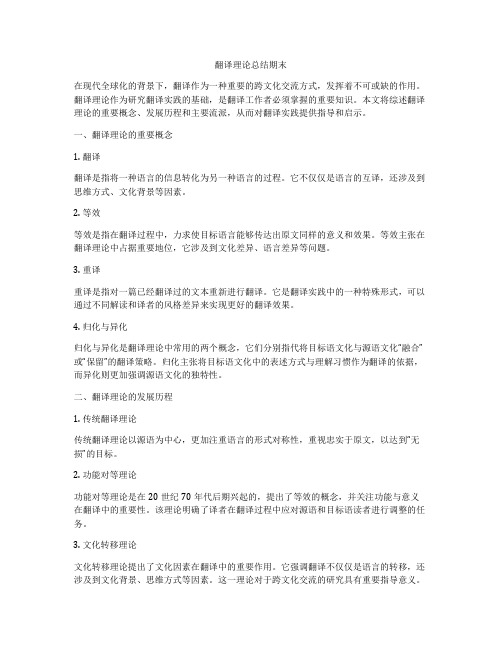
翻译理论总结期末在现代全球化的背景下,翻译作为一种重要的跨文化交流方式,发挥着不可或缺的作用。
翻译理论作为研究翻译实践的基础,是翻译工作者必须掌握的重要知识。
本文将综述翻译理论的重要概念、发展历程和主要流派,从而对翻译实践提供指导和启示。
一、翻译理论的重要概念1. 翻译翻译是指将一种语言的信息转化为另一种语言的过程。
它不仅仅是语言的互译,还涉及到思维方式、文化背景等因素。
2. 等效等效是指在翻译过程中,力求使目标语言能够传达出原文同样的意义和效果。
等效主张在翻译理论中占据重要地位,它涉及到文化差异、语言差异等问题。
3. 重译重译是指对一篇已经翻译过的文本重新进行翻译。
它是翻译实践中的一种特殊形式,可以通过不同解读和译者的风格差异来实现更好的翻译效果。
4. 归化与异化归化与异化是翻译理论中常用的两个概念,它们分别指代将目标语文化与源语文化“融合”或“保留”的翻译策略。
归化主张将目标语文化中的表述方式与理解习惯作为翻译的依据,而异化则更加强调源语文化的独特性。
二、翻译理论的发展历程1. 传统翻译理论传统翻译理论以源语为中心,更加注重语言的形式对称性,重视忠实于原文,以达到“无损”的目标。
2. 功能对等理论功能对等理论是在20世纪70年代后期兴起的,提出了等效的概念,并关注功能与意义在翻译中的重要性。
该理论明确了译者在翻译过程中应对源语和目标语读者进行调整的任务。
3. 文化转移理论文化转移理论提出了文化因素在翻译中的重要作用。
它强调翻译不仅仅是语言的转移,还涉及到文化背景、思维方式等因素。
这一理论对于跨文化交流的研究具有重要指导意义。
4. 重译和再翻译理论重译和再翻译理论强调翻译是一个不断发展的过程,通过对已有翻译作品的再审视和重新翻译,可以实现更好的翻译效果。
这一理论提醒翻译者不仅要注重翻译策略,还要不断提升自己的翻译水平。
三、翻译理论的主要流派1. 源语导向理论源语导向理论以源语为中心,强调翻译要忠实于原文,力求实现“无损”翻译。
大学英语翻译概论

01
诗歌翻译三美原则:意美、音美、形美
02
Beauty in Sense, Sound, Style
许渊冲
美国 奈达 Eugene Nida: 读者反应论
01
(Receptor’s response)
02
忠实原文
03
易于理解
04
形式恰当
05
吸引读者
06
01
Equivalence
与原文作用相符(表达方面的等值)
01
02
国际译联主席Betty Cohen:Never in history have we been so indispensable to trade, culture, peace, and humanity…Just imagine one day in the world without translation…would all be mute. We are like the electricity in the wires and the water in the tap.
04
A musician / an actor
03
关于译者的比喻:
2.The purpose of translation
交流信息,克服语言障碍
01
特定文本的翻译具有其特定的目的,有其预设的读者群
04
学习其他语言的文化和文明,帮助向更高的文明发展
02
帮助经济、政治等各方面的交流和发展
03
Translatability and untranslatability (Language / Cultural Barriers) Translatability is lower when (1) the work to be translated is quite distant both in time and space; (2) its form is very much unique; (3) the content is not shared in the two cultures.
翻译概论课程结束后心得体会

翻译概论课程结束后心得体会总体上看,翻译概论这门课更加深化了我对翻译的理解,即只学习中英文语言是不够的,翻译需要大量的实践和丰富的理论知识做基础。
而且,翻译过来的句子和文章也要有一定的逻辑性才又意义,才是真正使用的翻译。
在题材上,这学期我们既接触了应用文本,也涉猎了文学翻译:内容上,翻译学习广泛涵盖了广告、企宣、法律、政府文本、金融、文化各个领域:内容丰富,形式多样,不仅锻炼了我们的翻译能力,也开拓了我们的眼界。
一个学期下来,让我收获很多,主要是以下几个方面:首先,要想把翻译搞好,就要把基础知识弄扎实,稳固的基础知识是良好翻译的前提。
在这样的前提下,就需要我们平时多积累单词,没有大的词汇量根本没有办法顺利完成翻译。
单词不用刻意去背,但一定要从平时的学习中去总结,去积累。
值得注意的是一些固定搭配的词汇、俚语或成语,和在特定场合或在专业领域里有着不同解释的词汇。
比如,就在红楼梦的诗歌翻译中,形容中国的父母就用了“fond 这个词,就很好形容了中国父母对子女的爱,这不是普通寻常的关爱,而是搦爱,宠爱”,这要让我翻译,以我现在的水平确实是想不到用这个词的,这一点上课的时候我就深有体会。
又比如,在政府类的文本里面,任务到底是翻译成“mission,task,还是goal”,这就需要我们平时多体会,多留心,多揣摩相近词汇的细微差异了。
其次,语法知识的牢固是英语专业必须做到的本质工作,牢固的语法知识会帮助我们理解和翻译。
若语法不牢,那就根本不懂句子的逻辑关系,从而不能理解其所表达的含义。
此外,各个方面的知识也需要我们的掌握。
这也是翻译专业区别于非翻译专业的一个特点。
不仅是文化方面,经济,政治,饮食等等都需要积累。
因为将来若要从事翻译,那是触及到知识的方方面面,各行各业,知识的积累就能帮助做到面面俱到。
学习英语翻译,就是学会将母语中文翻译成英语,以及把英语翻译成中文的一个过程。
比如,在翻译人民币国际化的文本中,就出现了大量的金融词汇和众多的专业化表述,这不是临阵磨枪可以解决的,而是需要长时间的积累。
翻译概论Chapter1-2从翻译的比喻认识翻译的本质及翻译的原则
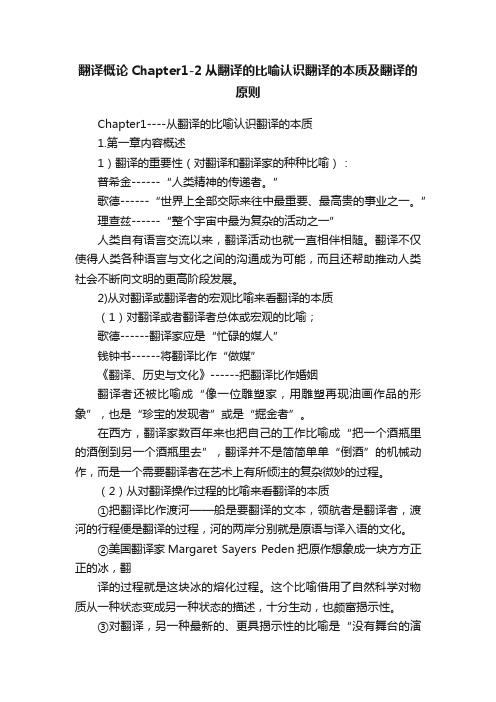
翻译概论Chapter1-2从翻译的比喻认识翻译的本质及翻译的原则Chapter1----从翻译的比喻认识翻译的本质1.第一章内容概述1)翻译的重要性(对翻译和翻译家的种种比喻):普希金------“人类精神的传递者。
”歌德------“世界上全部交际来往中最重要、最高贵的事业之一。
”理查兹------“整个宇宙中最为复杂的活动之一”人类自有语言交流以来,翻译活动也就一直相伴相随。
翻译不仅使得人类各种语言与文化之间的沟通成为可能,而且还帮助推动人类社会不断向文明的更高阶段发展。
2)从对翻译或翻译者的宏观比喻来看翻译的本质(1)对翻译或者翻译者总体或宏观的比喻;歌德------翻译家应是“忙碌的媒人”钱钟书------将翻译比作“做媒”《翻译、历史与文化》------把翻译比作婚姻翻译者还被比喻成“像一位雕塑家,用雕塑再现油画作品的形象”,也是“珍宝的发现者”或是“掘金者”。
在西方,翻译家数百年来也把自己的工作比喻成“把一个酒瓶里的酒倒到另一个酒瓶里去”,翻译并不是简简单单“倒酒”的机械动作,而是一个需要翻译者在艺术上有所倾注的复杂微妙的过程。
(2)从对翻译操作过程的比喻来看翻译的本质①把翻译比作渡河——船是要翻译的文本,领航者是翻译者,渡河的行程便是翻译的过程,河的两岸分别就是原语与译入语的文化。
②美国翻译家Margaret Sayers Peden把原作想象成一块方方正正的冰,翻译的过程就是这块冰的熔化过程。
这个比喻借用了自然科学对物质从一种状态变成另一种状态的描述,十分生动,也颇富揭示性。
③对翻译,另一种最新的、更具揭示性的比喻是“没有舞台的演④巴西翻译家——“食人者”对翻译者或者翻译的种种比喻尽管五花八门,但都有一个明显的特征,即它们基本上都是正面的,都包含对翻译者工作的褒扬,是确实还有少数比喻表达了对翻译或翻译者的否定或批评;如“翻译即背叛者等”。
2)翻译的本质翻译是一种文化传播的工具,在国与国之间、原语文化与译入语文化之间起着桥梁和纽带的作用;翻译不仅仅是文本从一种语言向另一种语言的过渡,也是文本之间、文化之间的一种协商过程,是以翻译者为中间人进行交流和斡旋的过程;翻译不仅仅是一门涉及语符转换、意义传递的技巧或技艺,更是一项极富创造性、挑战性的活动,是“一种艺术,一种需要译者像画家、表演家”那样具有高超创作才能的艺术。
翻译概论术语整理
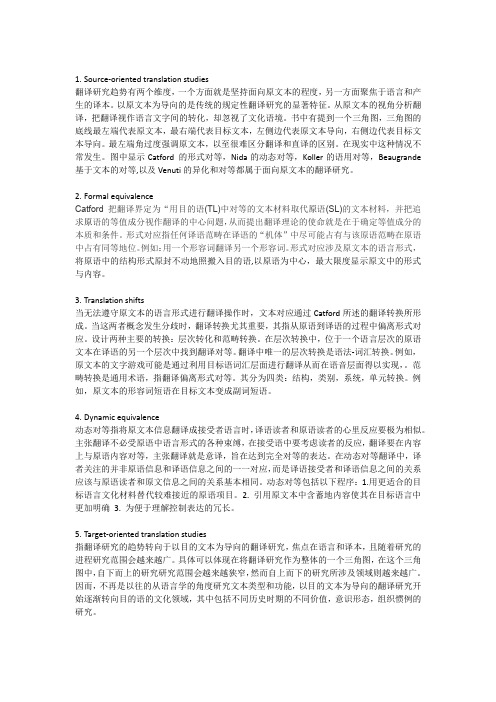
1.Source-oriented translation studies翻译研究趋势有两个维度,一个方面就是坚持面向原文本的程度,另一方面聚焦于语言和产生的译本。
以原文本为导向的是传统的规定性翻译研究的显著特征。
从原文本的视角分析翻译,把翻译视作语言文字间的转化,却忽视了文化语境。
书中有提到一个三角图,三角图的底线最左端代表原文本,最右端代表目标文本,左侧边代表原文本导向,右侧边代表目标文本导向。
最左端角过度强调原文本,以至很难区分翻译和直译的区别。
在现实中这种情况不常发生。
图中显示Catford 的形式对等,Nida的动态对等,Koller的语用对等,Beaugrande 基于文本的对等,以及Venuti的异化和对等都属于面向原文本的翻译研究。
2.Formal equivalenceCatford把翻译界定为“用目的语(TL)中对等的文本材料取代原语(SL)的文本材料,并把追求原语的等值成分视作翻译的中心问题,从而提出翻译理论的使命就是在于确定等值成分的本质和条件。
形式对应指任何译语范畴在译语的“机体”中尽可能占有与该原语范畴在原语中占有同等地位。
例如:用一个形容词翻译另一个形容词。
形式对应涉及原文本的语言形式,将原语中的结构形式原封不动地照搬入目的语,以原语为中心,最大限度显示原文中的形式与内容。
3.Translation shifts当无法遵守原文本的语言形式进行翻译操作时,文本对应通过Catford所述的翻译转换所形成。
当这两者概念发生分歧时,翻译转换尤其重要,其指从原语到译语的过程中偏离形式对应。
设计两种主要的转换:层次转化和范畴转换。
在层次转换中,位于一个语言层次的原语文本在译语的另一个层次中找到翻译对等。
翻译中唯一的层次转换是语法-词汇转换。
例如,原文本的文字游戏可能是通过利用目标语词汇层面进行翻译从而在语音层面得以实现,。
范畴转换是通用术语,指翻译偏离形式对等。
其分为四类:结构,类别,系统,单元转换。
翻译概论知识点整理
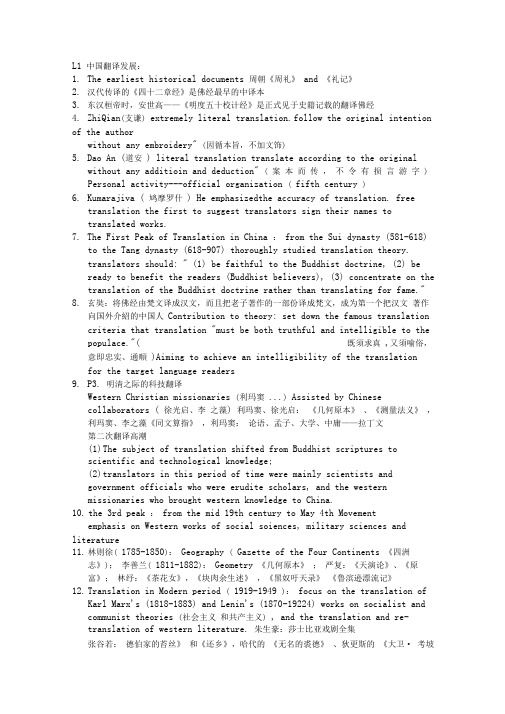
L1 中国翻译发展:1.The earliest historical documents 周朝《周礼》and 《礼记》2.汉代传译的《四十二章经》是佛经最早的中译本3.东汉桓帝时,安世高——《明度五十校计经》是正式见于史籍记载的翻译佛经4.ZhiQian(支谦) extremely literal translation. follow the original intention of the authorwithout any embroidery" (因循本旨,不加文饰)5.Dao An (道安) literal translation translate according to the originalwithout any additioin and deduction" ( 案本而传,不令有损言游字 ) Personal activity---official organization ( fifth century )6.Kumarajiva ( 鸠摩罗什) He emphasizedthe accuracy of translation. freetranslation the first to suggest translators sign their names totranslated works.7.The First Peak of Translation in China :from the Sui dynasty (581-618)to the Tang dynasty (618-907) thoroughly studied translation theory.translators should: " (1) be faithful to the Buddhist doctrine, (2) be ready to benefit the readers (Buddhist believers), (3) concentrate on the translation of the Buddhist doctrine rather than translating for fame."8.玄奘:将佛经由梵文译成汉文,而且把老子著作的一部份译成梵文,成为第一个把汉文著作向国外介紹的中国人Contribution to theory: set down the famous translation criteria that translation "must be both truthful and intelligible to the populace."( 既須求真,又須喻俗,意即忠实、通順)Aiming to achieve an intelligibility of the translation for the target language readers9.P3. 明清之际的科技翻译Western Christian missionaries (利玛窦...) Assisted by Chinesecollaborators ( 徐光启、李之藻) 利玛窦、徐光启:《几何原本》、《测量法义》,利玛窦、李之藻《同文算指》,利玛窦:论语、孟子、大学、中庸——拉丁文第二次翻译高潮(1)T he subject of translation shifted from Buddhist scriptures toscientific and technological knowledge;(2)t ranslators in this period of time were mainly scientists andgovernment officials who were erudite scholars, and the westernmissionaries who brought western knowledge to China.10.the 3rd peak :from the mid 19th century to May 4th Movementemphasis on Western works of social soiences, military sciences and literature11.林则徐( 1785-1850):Geography ( Gazette of the Four Continents 《四洲志》);李善兰( 1811-1882):Geometry 《几何原本》;严复:《天演论》、《原富》;林纾:《茶花女》,《块肉余生述》,《黑奴吁天录》《鲁滨逊漂流记》12.Translation in Modern period ( 1919-1949 ):focus on the translation ofKarl Marx's (1818-1883) and Lenin's (1870-19224) works on socialist and communist theories (社会主义和共产主义) , and the translation and re-translation of western literature. 朱生豪:莎士比亚戏剧全集张谷若:德伯家的苔丝》和《还乡》,哈代的《无名的裘德》、狄更斯的《大卫· 考坡菲》P7,鲁迅,矛盾,郭沫若,付东华,傅雷,林语堂13.杨必:玛丽亚?埃杰窝斯的《剥削世家》,翻译萨克雷( W. M. Thackeray)的VanityFair (《名利场》杨宪益和戴乃迭:《红楼梦》《老残游记》《离骚》《儒林外史》《鲁迅选集》《奥德修纪》《卖花女》许渊冲:翻译了《诗经》、《楚辞》、《李白诗选》、《西厢记》、《红与黑》、《包法利夫人》、《追忆似水年华》等众多名著。
英汉翻译-翻译概论

目录
• 翻译的定义与重要性 • 翻译的基本原则与技巧 • 翻译中的文化因素 • 翻译中的语义分析 • 翻译中的语用因素 • 机器翻译与人工翻译
01
翻译的定义与重要性
翻译的定义
01 翻译是将一种语言中的信息转变成另一种语言的 过程,同时保持原文的意义和风格。
02 翻译不仅仅是文字的转换,还包括文化、语境和 语意的传递。
归化与异化
归化
归化是指将原文翻译成目标语言的习惯表达方式,使译文更加符合目标语读者的阅读习 惯和审美需求。归化的优点是易于理解,但有时可能会失去原文的文化特色和语言风格。
异化
异化是指保留原文的语言和文化特 点是保留了原文的文化色彩和语言风格,但有时可能会使目标语读者感到陌生或不习惯。
准确
机器翻译通常能够提供相对准确的翻译结果,特别是在 处理一些常见和规范的文本时。
机器翻译的优势与局限
机器翻译的优势与局限
01
语义理解不足
机器翻译在处理复杂的语义和语 境时可能会遇到困难,导致翻译 结果不够准确。
文化差异
02
03
需要人工校对
机器翻译难以完全理解不同文化 背景下的语言含义,可能会造成 文化信息的损失。
• 灵活性高:人工翻译可以根据不同的需求 和情况进行个性化的翻译,满足不同的翻 译要求。
人工翻译的优势与局限
成本高
人工翻译需要耗费大量的人力资源,成本相对较高。
效率低
人工翻译的速度相对较慢,无法像机器翻译一样快速 完成大量文本的翻译。
语言错误
人工翻译在处理一些复杂或专业的文本时可能会出现 语言错误或疏漏。
03
翻译中的文化因素
文化背景的差异
01
翻译概论
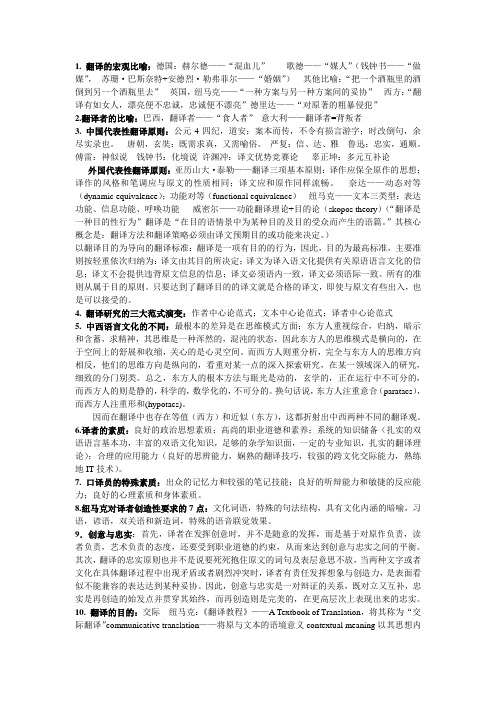
1.翻译的宏观比喻:德国:赫尔德——“混血儿”歌德——“媒人”(钱钟书——“做媒”,苏珊·巴斯奈特+安德烈·勒弗菲尔——“婚姻”)其他比喻:“把一个酒瓶里的酒倒到另一个酒瓶里去”英国,纽马克——“一种方案与另一种方案间的妥协”西方:“翻译有如女人,漂亮便不忠诚,忠诚便不漂亮”德里达——“对原著的粗暴侵犯”2.翻译者的比喻:巴西,翻译者——“食人者”意大利——翻译者=背叛者3. 中国代表性翻译原则:公元4四纪,道安:案本而传,不令有损言游字;时改倒句,余尽实录也。
唐朝,玄奘:既需求真,又需喻俗。
严复:信、达、雅鲁迅:忠实,通顺。
傅雷:神似说钱钟书:化境说许渊冲:译文优势竞赛论辜正坤:多元互补论外国代表性翻译原则:亚历山大·泰勒——翻译三项基本原则:译作应保全原作的思想;译作的风格和笔调应与原文的性质相同;译文应和原作同样流畅。
奈达——动态对等(dynamic equivalence);功能对等(functional equivalence)纽马克——文本三类型:表达功能、信息功能、呼唤功能威密尔——功能翻译理论+目的论(skopos theory)(“翻译是一种目的性行为”翻译是“在目的语情景中为某种目的及目的受众而产生的语篇。
”其核心概念是:翻译方法和翻译策略必须由译文预期目的或功能来决定。
)以翻译目的为导向的翻译标准:翻译是一项有目的的行为,因此,目的为最高标准,主要准则按轻重依次归纳为:译文由其目的所决定;译文为译入语文化提供有关原语语言文化的信息;译文不会提供违背原文信息的信息;译文必须语内一致,译文必须语际一致。
所有的准则从属于目的原则。
只要达到了翻译目的的译文就是合格的译文,即使与原文有些出入,也是可以接受的。
4. 翻译研究的三大范式演变:作者中心论范式;文本中心论范式;译者中心论范式5. 中西语言文化的不同:最根本的差异是在思维模式方面:东方人重视综合,归纳,暗示和含蓄,求精神,其思维是一种浑然的,混沌的状态,因此东方人的思维模式是横向的,在于空间上的舒展和收缩,关心的是心灵空间。
翻译学概论
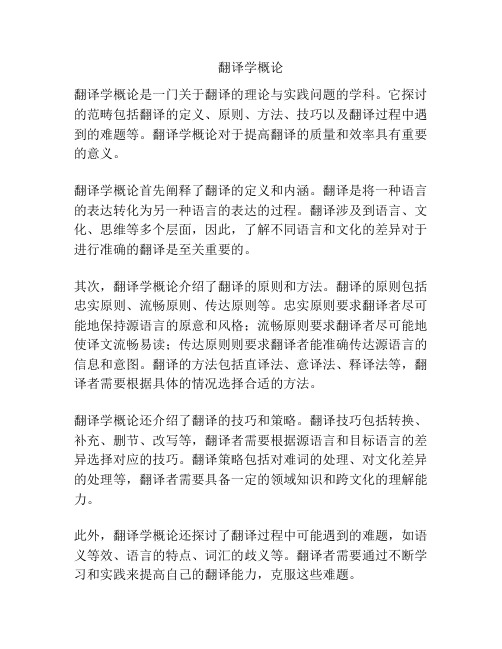
翻译学概论
翻译学概论是一门关于翻译的理论与实践问题的学科。
它探讨的范畴包括翻译的定义、原则、方法、技巧以及翻译过程中遇到的难题等。
翻译学概论对于提高翻译的质量和效率具有重要的意义。
翻译学概论首先阐释了翻译的定义和内涵。
翻译是将一种语言的表达转化为另一种语言的表达的过程。
翻译涉及到语言、文化、思维等多个层面,因此,了解不同语言和文化的差异对于进行准确的翻译是至关重要的。
其次,翻译学概论介绍了翻译的原则和方法。
翻译的原则包括忠实原则、流畅原则、传达原则等。
忠实原则要求翻译者尽可能地保持源语言的原意和风格;流畅原则要求翻译者尽可能地使译文流畅易读;传达原则则要求翻译者能准确传达源语言的信息和意图。
翻译的方法包括直译法、意译法、释译法等,翻译者需要根据具体的情况选择合适的方法。
翻译学概论还介绍了翻译的技巧和策略。
翻译技巧包括转换、补充、删节、改写等,翻译者需要根据源语言和目标语言的差异选择对应的技巧。
翻译策略包括对难词的处理、对文化差异的处理等,翻译者需要具备一定的领域知识和跨文化的理解能力。
此外,翻译学概论还探讨了翻译过程中可能遇到的难题,如语义等效、语言的特点、词汇的歧义等。
翻译者需要通过不断学习和实践来提高自己的翻译能力,克服这些难题。
总的来说,翻译学概论是一门综合性的学科,它涉及到语言、文化、思维等多个方面。
通过学习翻译学概论,翻译者可以提高自己的翻译水平,提高翻译的质量和效率,更好地进行跨文化交流。
翻译概论总复习
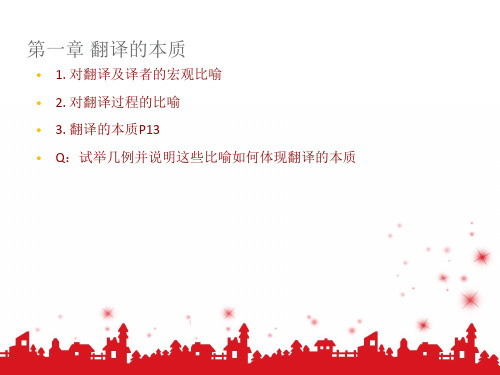
第二章 翻译的原则
• Q:初学者而言;应采用怎么样的翻译原则
第三章 翻译与文化
• 1. 语言与文化的关系: • 2. 翻译中的文化渗透:异质性foreigness
3. 文化差异与翻译:英汉语的不同P37
Q:佛经翻译对我国文化的影响
第四章 译者的素质
• 1. 译者的责任:宏观、微观 • 2. 译者素质:奈达4个条件 P49 • Q:译者一定要懂一点翻译理论吗;请举例阐述.. • 译者在社会和文化层面有哪些责任
第八章 机器翻译
• 机器翻译的分类及其英文表达 • 机器翻译的简史
第九章 理解与翻译
• 1. Eugene A. Nida 的翻译步骤P136 • analysis; transer; restructuring; testing • 2. Gorge Stainer 的翻译步骤 • initiative trust; aggresstion; incorporation; compensation
第二章 翻译的原则
• 国外 • 1. Alexander Fraser Tytler: 三原则P21 • 2. Catfort: 篇章等值行文、形式 • 3. Eugene A. Nida: 动态对等-功能对等functional equivalence • 4. Peter Newmark: 文本功能表达、信息、呼唤 语义翻译、交际翻译
• 1. 翻译的失: • 2. 翻译的得: • 3. 如何看待翻译的得与失
期末考试题型
• 一、填空题1'*15=15' • 二、术语匹配1'*15=15' • 三、简答题 4'*10=40' • 四、综合论述题30'
- 1、下载文档前请自行甄别文档内容的完整性,平台不提供额外的编辑、内容补充、找答案等附加服务。
- 2、"仅部分预览"的文档,不可在线预览部分如存在完整性等问题,可反馈申请退款(可完整预览的文档不适用该条件!)。
- 3、如文档侵犯您的权益,请联系客服反馈,我们会尽快为您处理(人工客服工作时间:9:00-18:30)。
多项选择:1. Roman Jakobson’s tripartite classification: intralingual translation (rewording), interlingual translation (translation proper), and intersemiotic translation (transmutation)2. text types: technical, institutional, literary translation3. outline of major theories of translation:(1) Chronologically (by the time of their birth or occurrence): the philological, hermeneutic, linguistic, communicative, sociosemiotic, skopos, manipulative, norm, post-structuralist, postcolonial(2) topologically (by the particular approach adopted or focus directed by their proponents): their approaches to translation may be grouped into the philological, linguistic, functionalist, semiotic, cultural, philosophical.重要概念:1. translation studies:(1). The paper “the name and nature of translation studies”written by James Holmes in 1988, marks the birth of the discipline of TS.The descriptive branch: product, process, function-oriented The theoretical branch:general & partial which includes medium, area, rank, text type, time, and problem restrictedThe applied branch: translation aids, training and criticism Note: though being lucid and inspiring in his theory, it shall be noted that description and theorizing are usually inseparable from each other in research.(2). The internal studies and external studiesThe internal studies:the theoretical branch takes as its objects of study the nature, principles, and procedures of translation; the applied branch includes translation practice (text analysis and genre translation), T criticism, and the training of translators, development of the translation profession.Specifically, translation practice includes text analysis and genre translation, and the former covers such areas of research as: source text analysis, comparison of translations & their source texts, comparison of translations and non-translated texts (comparable texts), translation with commentary; while the genre translation covers texts like drama, poetry, prose fiction, religious text, tourism texts, and multimedia texts.The external translation studies are the derived or borderline parts of TS, covering areas where the internal TS interact or marry with other disciplines, such as history, sociology, cultural anthropology, philosophy, linguistics, psychology, theory of communication, computer science and technology, etc. For example, history of translation; sociology and cultural studies of T; T ethics; terminology management; language and translation technology…Or historical/cultural translation; translation ethics; terminology and glossaries; translation and technologyThe internal studies and the external studies of translation are related and complementary to each other in that the research results in the former provide the latter with both a theoretical basis and a practical focus of concern while the research findings in external studies contribute to the depth and breadth of internal studies by providing new observations and new perspectives.2. definition of translation:According to Wilss (1995), translation is an action directed toward both the source text and the reader of the target language. Its procedure is determined by its function and itpursues a goal of enabling understanding between individuals of different linguistic and cultural communities.Nida and Taber (1969) regard translation as a communication-based task and define it as: Translation consists in reproducing in the receptor language the closest natural equivalent of the source language message, first in terms of meaning, and secondly in terms of style. (closest in meaning and style; acceptability; loss of information)-- translation as a kind of communication between different language group-- translation should communicate information or meaning3. theory:A theory, in the simplest sense, is just a view or understanding of something that concerns us. In modern science, it is generally understood or refers to a proposed explanation of empirical phenomena, made in a way consistent with scientific method. Theories are collections of hypotheses that are logically linked together into a coherent explanation of some aspect of reality and which have individually or jointly received some empirical support.The properties of a good theory: strong explanatory power that can effectively explain the subject matter it pertains to;strong predicative power which means it should proved a) reasonably adequate predictions about the properties not yet discovered of the specific object under investigation and b) a measure of predictability about the degree of success to be expected from the use of certain principles and procedures in the study of the subject matter.3. equivalence:A term used by many writers to describe the nature and the extent of the relationships which exist between SL and TL texts or smaller linguistic units. The nature of “equivalence” was successively discussed by prominent figures such as Jakobson, Eugene Nida, Peter Newmark, and Werner Koller.(1) Jakobson’s linguistic meaning and equivalence. He followed the relation set out by Saussure between the signifier (the spoken and written signal) and the signified(the concept signified). He stated that the signifier and signified form the linguistic sign, but the sign is arbitrary or unmotivated, thus there is ordinarily no full equivalence between ST and TT. He defined translation as “substituting messages in one language not for separate code-units (signifier) but to entire messages (signified) in some other language”.(2) Catford regarded the central task of translation as“defining the nature and conditions of translation equivalence” and there exists a distinction between textual equivalence and formal correspondence.(3) Nida, inspired by Noam Chomsky’s generative-transformational grammar, put forward a three-stage system of translation and used back-transformation to analyze the kernels under some complicated surface structure. In terms of equivalence, he stated that there areformal equivalence which focuses attention on the message itself in both form and content, the message in the receptor language should match as closely as possible the different elements in the source language.Dynamic equivalence is based on the principle of equivalent effect, where the relationship between receptor and message should be substantially the same as that which existed between the original receptor and the message.There are four basic requirements of a translation.(4) Newmark put forward the notions of communicative translation and semantic translation.Communicative translation attempts to produce on its reader an effect as close as possible to that obtained on the readers of the original.Semantic translation attempts to render, as closely as the semantic and syntactic structures of the second language allow, the exact contextual meaning of the original.4. meaning:According to Nida, meaning is broke down into linguistic meaning, referential meaning and emotive meaning.In terms of traditional studies of meaning, the meanings of meaning are as follows:reference and sense: reference is the relationship between words and the things, actions, events, and qualities they stand for; sense is the place a which a word or phrase holds in the system of relationships with other words or phrases in the vocabulary of a language.From the perspective of sociosemiotics, there are 4 basic facts about meaning:1) meaning is a kind of relationship.Meaning is not really an entity (because words do not have meanings, people have meanings for words), but the relationship between a sign and something outside it2) there is a plurality of meaning: three kinds of relationshipa sign may enter into – referential(semantic), pragmatic,syntactic (intralingual);a. Referential meaning (RM) (sign-real world entity)is chiefly connected with the topic of a communication. Its core elements are the external situation, the facts of the real world. Also known as informative, conceptual, cognitive meaning. But RM does not equal literal meaning (LM). E.g 挂号信;vice-chancellor;indian meal;国际学院;基础实验楼b. Pragmatic meaning (PM) (sign-user)may be divided into four subsets: identificational meaning (regional, historial background of the speaker); expressive meaning (emotional content of an expression might have in terms of the personality or individual creativity of the user, e.g murder & homicide); associative meaning (connotative meaning隐含意义); social meaning (channel of contact, e.g phatic forms of discourse; forms of address vous/tu; flatter; register); imperative meaning (conative meaning, operative or instrumental meaning)c. intralingual meaning (IM) (sign-sign)is related to the code: phonetic meaning; phonological meaning; graphemic meaning; morphological/lexemic meaning, syntactic meaning, discoursal/textual meaning3) style is meaning. S tyle in its linguistic sense is reduced to a group of pragmatic meaning and intralingual meanings.4) different meaning may carry different weight in different contexts.5. code: a system of signs or signals involved in the transmission of messages. Language as a code is a system of multiplicity, i.e. it is composed of diverse elements or has different aspects.6. sign: a thing that signifies or stands for another thing or things.7. signification: using signs to mean. A third item is included in the process of signification, that is, an abstract concept of the thing for which the sign stands.8. message: according to Nida and Taber, it consists of two aspects: meaning and style9. fusion of horizon: the meeting of different perspectives or backgrounds. So far as translation is concerned, this concept implies that a translator has to emerge from his own intellectual perspective and cultural background in order to assimilate what is foreign in a new light.总结自己学习情况:Taking the course “Introduction of Translation Studies” is conducive to the improvement of both my theoretical and practical inquiry on translation. It is a pity that we cannot cover all the items outlined in the syllabus such as the skopos theory and the manipulation school, which I find them an enlightening reading as I read them in Jeremy Munday’s “Introducing Translation Studies”.As far as I am concerned, the benefits by taking this course are twofold. First, owning to the systematic exemplifications and illustrations discussed in class, I have a better understanding of the major schools of translation chronologically and topologically. Equipped with the basic knowledge and systematic framework of translation studies, I can conduct my research or my future thesis paper from an in-depth perspective. The philological approach mainly concerning on the “word for word” or “sense for sense”debate, though案例分析:1. deep structure analysisThe surface structure is the syntactic structure of thesentence which a person speaks, hears, reads or writes. It is the actually observed structure of a sentence.The deep structure is much more abstract and it is considered to incorporate all information relevant to the single or unambiguous interpretation of a particular sentence.Nida believes that the English language possesses seven such basic structures, which he terms “kernels”– the minimal number of structures from which the rest can be most efficiently and relevantly derived.Nida advocated the back-transformation of complex surface structures onto an underlying level, in which the fundamental elements are objects, events, abstracts, and relationals. Four steps for analyzing and transferring complicated SL sentences(1) determine whether each word is an object, and event, an abstract, or a relational(2)identify the kernels,(making explicit the implicit constituent elements of the kernels: who are the recipient and agent?)(3) determine the semantic and logical relationships between kernels (grouping the kernels into related sets)(4) find out the most efficient way of representing the givenrelationships between kernels in the target language. (state these relationships in a form which will be optimal, i.e. closest to the form in the target language, for transfer into the target language)例子:the unique and mixed ethnic heritage of the population; the American defence of Bastogne sealed their (Nazi troops) fate; this land, which once barred the way of weary travelers, now has become a land for winter and summer vacation, a land of magic and wonder.2. transliteration 以义出音 vs. translation: a terminological study of the rendition of a sutra text翻译:长答题(essay questions;optional):1. the philological school, which lays emphasis on the source text, including its production, transmission, and history of interpretation, a typical question raised with this school being that of whether the translator should bring the original to the target reader (liberal translation) or the target language reader to the original (literal translation). Philological tradition in the western history can beillustrated chronologically:a) roman times – word for word vs. sense for sense. Cicero & Horace & Quintilian: liberal translation; St. Augustine: literal translationb) the middle ages –debate between translation and unacceptable interpretation. St. Jerome, father of the church, translated the Bible into Latin, and developed the Ciceronian distinction between the undesirable “word for word”translation and the desirable “sense for sense”translation. Translator such as King Alfred in England perceived the task of translating the Bible as linked to the task of elevating the status of the newly developing language known as English, i.e. the Old English.c) the Renaissance –“copying”an original, but also creating a new text with an individual voice. Focus on how to strike a balance in between and how to remain faithful without being subservient.d) Reformation – doctrinal fidelity vs. possible heretical “mistranslation”. Martin Luther elevated and disseminated the usage of German by his translation of the Bible. Etienne Dolet, burn at the stake for his addition to his translation of one of Plato’s dialogues, advocated five principles intranslation.e) the 17th & 18th centuries – diversion of the activity of translation: translation as recovery or imitation of classical text; as language learning exercise; as commercial enterprise. John Dryden reduces all translation to three categories: the triadic model: metaphrase, paraphrase, and imitation. The Port- Royal grammar put forward that “accuracy”in translation could somehow be measured on a qualifiable basis. Alexander Tytler reacted against Dryden’s “paraphrase”(loose translation) and set up three basic and celebrated principles of translation: complete transcript of ideas, style and manner of the same character, and all the ease of the originalf) the 19th century –romanticism and “creative translation”, which centered around the problem of whether translation could be considered as a creative or a mechanical enterprise.g) the 20th century – the philological tradition enduredIn conclusion, the methodology of this school is introspective, impressionistic, relying heavily on the researchers’and practitioners’intuition. Its central concepts are too abstract to be unequivocally understood and too fuzzy to serve as a reliable basis on which detailed theoretical analysis canbe conducted and universally accepted conclusion drawn simply because different people may have different views of these concepts.2. the hermeneutic school, which concerns the interpretative process of the ST.The term “hermeneutics” is used in two senses: the part of Christian theology解经学 and theory of understanding and interpretation of the significance of human actions, utterances, products, and institutions 阐释学。
